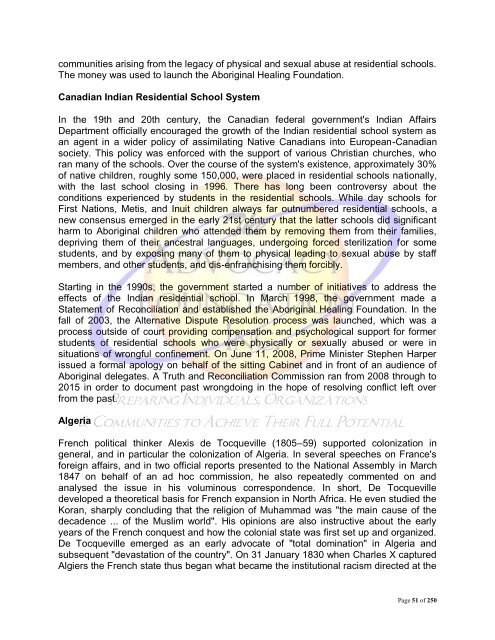Institutional Racism
Institutional Racism
Institutional Racism
Create successful ePaper yourself
Turn your PDF publications into a flip-book with our unique Google optimized e-Paper software.
communities arising from the legacy of physical and sexual abuse at residential schools.<br />
The money was used to launch the Aboriginal Healing Foundation.<br />
Canadian Indian Residential School System<br />
In the 19th and 20th century, the Canadian federal government's Indian Affairs<br />
Department officially encouraged the growth of the Indian residential school system as<br />
an agent in a wider policy of assimilating Native Canadians into European-Canadian<br />
society. This policy was enforced with the support of various Christian churches, who<br />
ran many of the schools. Over the course of the system's existence, approximately 30%<br />
of native children, roughly some 150,000, were placed in residential schools nationally,<br />
with the last school closing in 1996. There has long been controversy about the<br />
conditions experienced by students in the residential schools. While day schools for<br />
First Nations, Metis, and Inuit children always far outnumbered residential schools, a<br />
new consensus emerged in the early 21st century that the latter schools did significant<br />
harm to Aboriginal children who attended them by removing them from their families,<br />
depriving them of their ancestral languages, undergoing forced sterilization for some<br />
students, and by exposing many of them to physical leading to sexual abuse by staff<br />
members, and other students, and dis-enfranchising them forcibly.<br />
Starting in the 1990s, the government started a number of initiatives to address the<br />
effects of the Indian residential school. In March 1998, the government made a<br />
Statement of Reconciliation and established the Aboriginal Healing Foundation. In the<br />
fall of 2003, the Alternative Dispute Resolution process was launched, which was a<br />
process outside of court providing compensation and psychological support for former<br />
students of residential schools who were physically or sexually abused or were in<br />
situations of wrongful confinement. On June 11, 2008, Prime Minister Stephen Harper<br />
issued a formal apology on behalf of the sitting Cabinet and in front of an audience of<br />
Aboriginal delegates. A Truth and Reconciliation Commission ran from 2008 through to<br />
2015 in order to document past wrongdoing in the hope of resolving conflict left over<br />
from the past.<br />
Algeria<br />
French political thinker Alexis de Tocqueville (1805–59) supported colonization in<br />
general, and in particular the colonization of Algeria. In several speeches on France's<br />
foreign affairs, and in two official reports presented to the National Assembly in March<br />
1847 on behalf of an ad hoc commission, he also repeatedly commented on and<br />
analysed the issue in his voluminous correspondence. In short, De Tocqueville<br />
developed a theoretical basis for French expansion in North Africa. He even studied the<br />
Koran, sharply concluding that the religion of Muhammad was "the main cause of the<br />
decadence ... of the Muslim world". His opinions are also instructive about the early<br />
years of the French conquest and how the colonial state was first set up and organized.<br />
De Tocqueville emerged as an early advocate of "total domination" in Algeria and<br />
subsequent "devastation of the country". On 31 January 1830 when Charles X captured<br />
Algiers the French state thus began what became the institutional racism directed at the<br />
Page 51 of 250

















